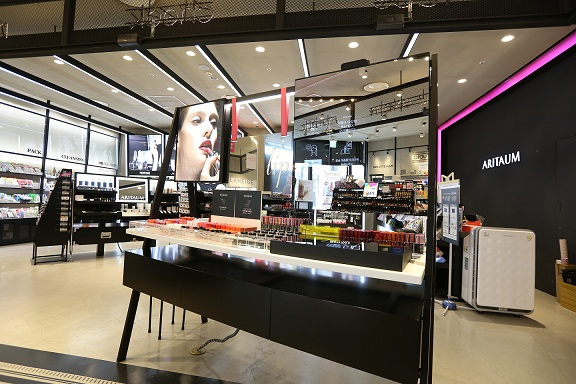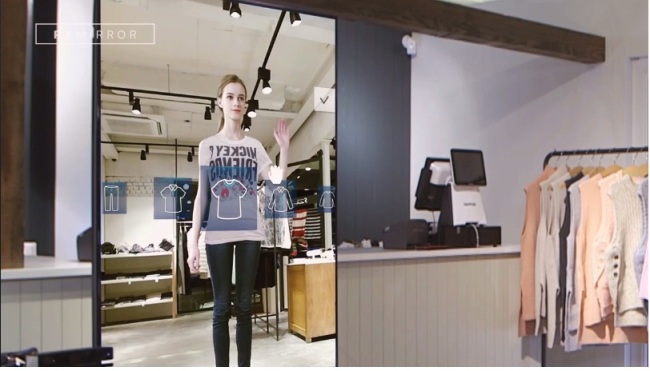[
THE INVESTOR] The explosive popularity of Nintendo and Niantic’s augmented reality game “Pokemon Go” has set off a boom in Korea, with companies, the government and consumers thinking about how the combination of reality and digital imagination can change everyday life.
For now, the primary focus is on games and entertainment as augmented reality is largely perceived as an advanced version of virtual reality. Virtual reality, which completely changes how users perceive their surroundings rather than adding components, such as Pokemon, to their actual surroundings, has already become a major force in gaming and film.

The AR Makeup Mirror in an AmorePacific Aritaum store. AmorePacific
However, augmented reality has more potential for everyday lifestyle use because it brings new elements into familiar surroundings.
The new possibilities for interaction between content and consumer make AR an attractive platform for direct communication strategies in fields like marketing.
“We don’t have any AR projects on the books yet, but AR is something that we have to discuss going forward,” a spokesperson for advertising firm Innocean Worldwide told The Korea Herald. With regards to previous ad campaigns that utilized VR, he said, “Advertising is about sending a direct message. VR transforms that message into an experience, connecting with users in a new, fresh way. AR would be another interesting platform.”
Consumer companies are already trying out this idea on a smaller scale. In the beauty sector, cosmetics-maker AmorePacific has brought AR into its stores in Coex and Sinchon in Seoul by enhancing customers’ shopping services through the Makeup Mirror.
When customers stands in front of a mirror, the mirror automatically analyzes their skin tone to recommend the right products for their skin type. When the products are placed on a bar in front of the mirror, the mirror produces information about the products and online reviews by other consumers.
“A cosmetics store is not only a place for purchasing products. It is a space designed for customer experience, where customers can test various products and gain information to choose the right products,” a spokesperson for AmorePacific told The Korea Herald. “Using cutting-edge technology for customer experiences is useful because it can provide customized service to groups like younger consumers and foreign consumers.”
A similar product is the FXMirror, created by Korean venture company FXGear. The mirror analyzes customers’ body measurements, then allows them to virtually try on clothing. Unlike previous virtual fitting technology, FXMirror moves the clothing on the body’s reflection as if the person is actually wearing it.
The government has latched on to the trend as well. The Ministry of Education announced earlier this month that it will be pushing for the use of digital textbooks in elementary and middle school classrooms by 2018, to be used in combination with paper textbooks. Although the textbooks will not initially fully service VR or AR content, that is the general direction of the policy in the future.

The FXMirror, a virtual fitting mirror from FXGear. FXGear website
Korea is still relatively new in the AR content market, especially in areas beyond gaming. Overseas, there is vibrant research into utilizing AR to optimize experiences in fields as varied as medical therapy and construction.
However, that is beginning to change. According to the Korea Intellectual Property Office, filings for AR patents rose from an annual average of 52 between 2005 and 2009 to 619 between 2010 and 2014. Of those, 13.4 percent of AR patents were involved in education content, followed by 11.6 percent in medicine, 9 percent in culture and 8 percent in sports.
According to mobile Internet research firm Digi-capital in April, the augmented reality market is expected to reach $90 billion globally by 2020 through hardware sales, advertisement spending, in-app purchases and subscription services.
By Won Ho-jung/The Korea Herald (
hjwon@heraldcorp.com)







